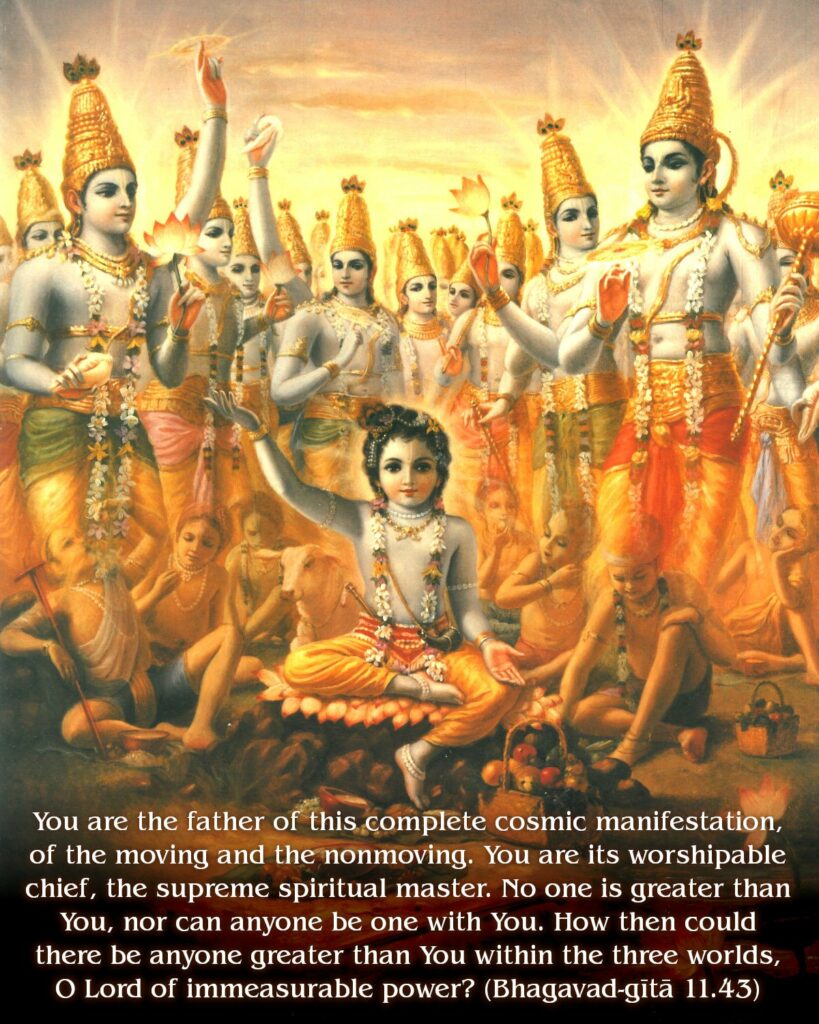पितासि लोकस्य चराचरस्य
त्वमस्य पूज्यश्च गुरुर्गरीयान् |
न त्वत्समोऽस्त्यभ्यधिक: कुतोऽन्यो
लोकत्रयेऽप्यप्रतिमप्रभाव || 43||
pitāsi lokasya charācharasya
tvam asya pūjyaśh cha gurur garīyān
na tvat-samo ’sty abhyadhikaḥ kuto ’nyo
loka-traye ’py apratima-prabhāva
pitā—the father; asi—you are; lokasya—of the entire universe; chara—moving; acharasya—nonmoving; tvam—you; asya—of this; pūjyaḥ—worshipable; cha—and; guruḥ—spiritual master; garīyān—glorious; na—not; tvat-samaḥ—equal to you; asti—is; abhyadhikaḥ—greater; kutaḥ—who is; anyaḥ—other; loka-traye—in the three worlds; api—even; apratima-prabhāva—possessor of incomparable power
Translation:
Thou art the Father of the world— of all that move and all that do not move. Thou art the object of its worship, its most venerable Teacher. There is no one equal to Thee; how then, in the three worlds, could there be another superior to Thee, Ο Thou of incomparable might?
Commentary:
The Lord has already declared that He is the Father, Mother, Grandsire, of the universe. Arjuna understands the truth now, and worhships the Lord as Father and Guru. He is the highest Guru, the Guru of Gurus, the Universal Master (Jagadguru). The Lord is the only reality, and all else is ‘asat’ non-existing illusion. This being so, how can there be anything equal or greater than the Lord? He is the final refuge for all beings.
Sri Ramakrishna Says —
MASTER: “Say to God with a guileless heart, ‘O God, reveal Thyself to me.’ And weep. Pray to God, ‘O God, keep my mind away from “woman and gold”.’ And dive deep. Can a man get pearls by floating or swimming on the surface? He must dive deep.
“One must get instruction from a guru. Once a man was looking for a stone image of Siva. Someone said to him: “Go to a certain river. There you will find a tree. Near it is a whirlpool. Dive into the water there, and you will find the image of Siva.’ So I say that one must get instruction from a teacher.”
ISHAN: “That is true, sir.”
MASTER: “It is Satchidananda that comes to us in the form of the guru. If a man is initiated by a human guru, he will not achieve anything if he regards his guru as a mere man. The guru should be regarded as the direct manifestation of God. Only then can the disciple have faith in the mantra given by the guru. Once a man has faith he achieves all. The sudra Ekalavya learnt archery in the forest before a clay image of Drona. He worshipped the image as the living Drona; that by itself enabled him to attain mastery in archery.
“Don’t mix intimately with brahmin pundits. Their only concern is to earn money. I have seen brahmin priests reciting the Chandi while performing in the swastyayana. It is hard to tell whether they are reading the sacred book or something else. They turn half the pages without reading them. (All laugh.)
“A nail-knife suffices to kill oneself. One needs sword and shield to kill others. That is the purpose of the sastras.
“One doesn’t really need to study the different scriptures. If one has no discrimination, one doesn’t achieve anything through mere scholarship, even though one studies all the six systems of philosophy. Call on God, crying to Him secretly in solitude. He will give all that you need.” (Source: Gospel of Sri Ramakrishna)
Question: How is Paramatma further described?
Answer: He is the father of the world, the most revered, the highest Guru, of incomparable power in all the worlds, having none equal or superior.
Bhagavad Gita: Chapter 11 🔻 (55 Verses)
| 01 | 02 | 03 | 04 | 05 | 06 | 07 | 08 | 09 | 10 |
| 11 | 12 | 13 | 14 | 15 | 16 | 17 | 18 | 19 | 20 |
| 21 | 22 | 23 | 24 | 25 | 26 | 27 | 28 | 29 | 30 |
| 31 | 32 | 33 | 34 | 35 | 36 | 37 | 38 | 39 | 40 |
| 41 | 42 | 43 | 44 | 45 | 46 | 47 | 48 | 49 | 50 |
| 51 | 52 | 53 | 54 | 55 |
